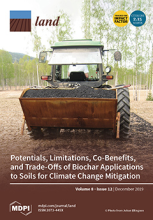Land Library
Bienvenue dans la bibliothèque du Land Portal. Explorez notre vaste collection de ressources en libre accès (plus de 74 000), comprenant des rapports, des articles scientifiques, des articles de recherche, des publications évaluées par des pairs, des documents juridiques, des vidéos et bien plus encore.
/ library resources
Showing items 1 through 9 of 21.The importance of agri-food systems for global sustainability calls for researching and advancing socio-technical transitions towards environmentally friendly models of farming.
Building inclusive societies that reflect the needs of all categories of people within the social spectrum is critical to achieving sustainable development.
Most literature on land tenure in sub-Saharan Africa has presented women as a homogenous group. This study uses evidence from Ghana, Nigeria, and Zimbabwe to show that women have differentiated problems, needs, and statuses in their quest for land access and tenure security.
Mainland Southeast Asia (MSA) has seen sweeping upland land use changes in the past decades, with transition from primarily subsistence shifting cultivation to annual commodity cropping. This transition holds implications for local upland communities and ecosystems.
This article argues that there is a transformation in the relationship between land, peasant communities and its members or comuneros.
El artículo analiza y sistematiza algunos aspectos de doctrina judicial relativos a los criterios para determinar la relación que existe entre el derecho al agua y saneamiento como derecho humano, los principios y reglas propios que distinguen la prestación de este tipo de servicios públicos, y l
El objetivo del trabajo es examinar la revisión oficial de las “donaciones condicionadas” implementadas en el partido de Azul y la respuesta de la sociedad rural durante la segunda mitad del siglo XIX.
Anecdotal evidence suggests that, in stateless regions in Colombia, the establishment of oil palm 1 plantations generates more forced migration than the introduction of coca crops.
A partir de fines del siglo XIX la población indígena de Pampa, Patagonia y Chaco (Argentina) fue incorporada en forma subordinada a la economía política capitalista, a través de una serie de prácticas genocidas y destribalizadoras que han sido exhaustivamente analizadas.





